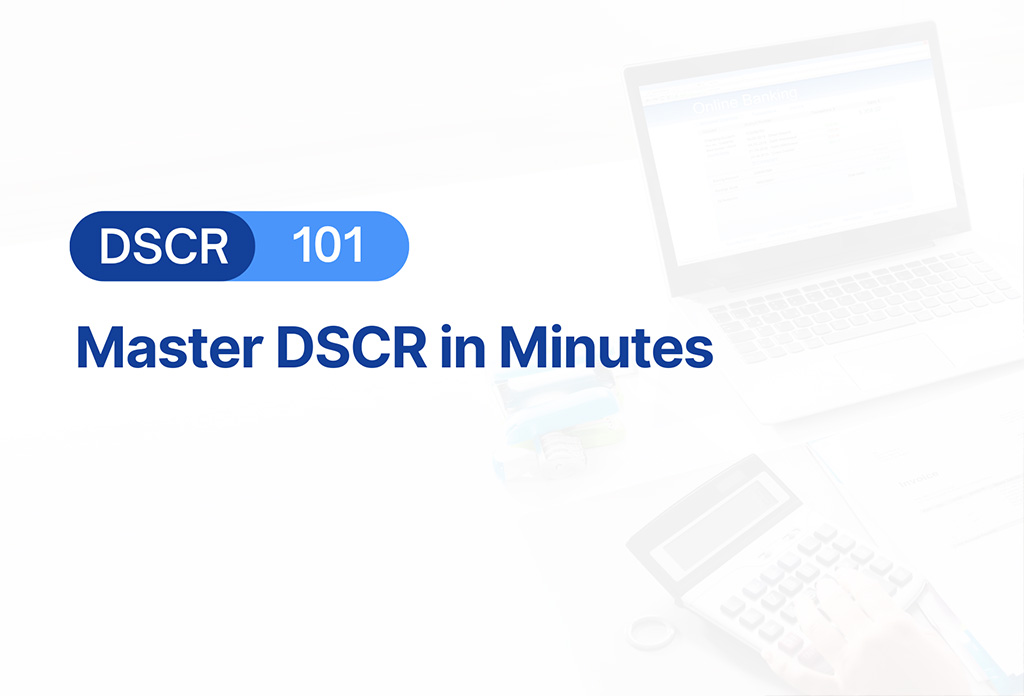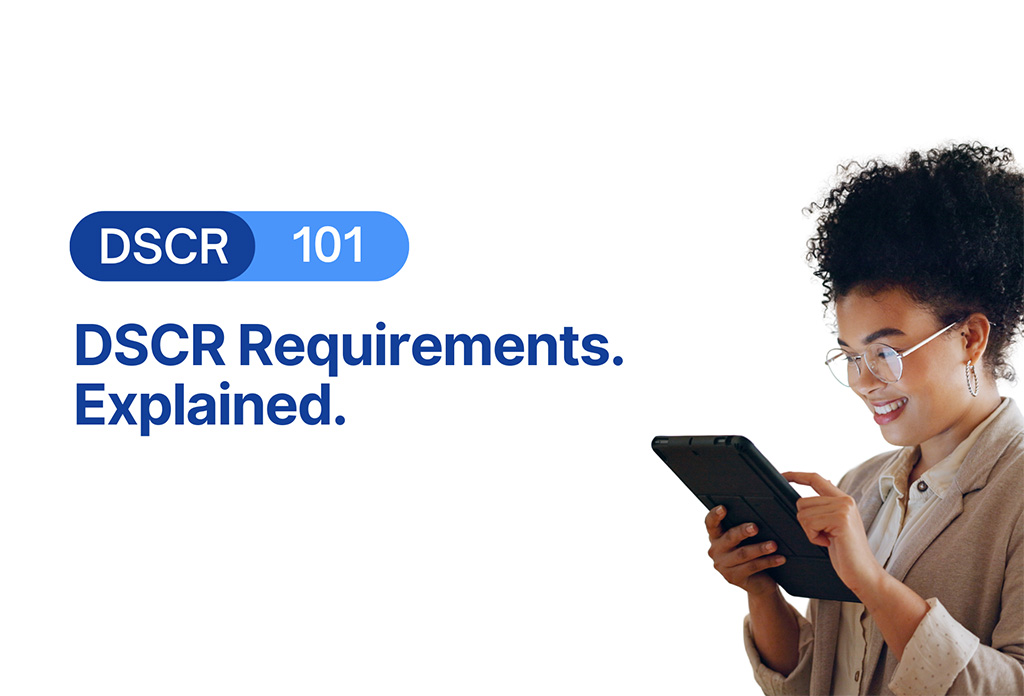Understanding how to calculate the Debt Service Coverage Ratio (DSCR) in real estate helps investors and brokers assess the financial strength of an income-producing property.
The Debt Service Coverage Ratio (DSCR) indicates whether a property generates sufficient cash flow to cover the cost of its loan. This metric is important because lenders use it to determine whether a property qualifies for financing. At Lendz Financial, we rely on DSCR to evaluate mortgage coverage, especially for 1-4 unit residential properties.
What Is DSCR in Real Estate?
DSCR in real estate refers to the ratio between a property’s income and its annual debt payments. It shows how much cash flow remains after servicing a mortgage. A higher DSCR means a stronger ability to meet financial obligations.
We use this ratio primarily in residential mortgage scenarios. It applies to investment properties where the borrower qualifies based on rental income. This is especially relevant for our DSCR loan program, which focuses on 1-4 unit properties and gives brokers more flexibility during the approval process.
DSCR Formula in Real Estate
To calculate the Debt Service Coverage Ratio (DSCR), we divide the property’s gross rental income by its total annual debt service payments. The basic formula is:
.png)
Debt obligations include mortgage principal and interest, property taxes, homeowner’s insurance, and any HOA dues or maintenance fees tied to the property. We typically confirm rental income through a lease agreement or a 1007 rent schedule for residential DSCR loans.
The goal is to assess whether the property generates a steady cash flow that meets or exceeds the annual debt obligation.
Assessing the DSCR Value in Real Estate Investment
A good DSCR varies depending on the lender, property type, and local market conditions. Generally, a DSCR of 1.0 means the property brings in just enough income to cover its mortgage. A DSCR above 1.0 indicates a margin of safety and a stronger financial profile. At Lendz Financial, we accept flexible DSCR thresholds for eligible borrowers.
When markets shift, DSCR performance shifts too. Rising interest rates increase debt payments, which can lower the ratio unless rents rise as well. In slower rental markets, a property may experience lower occupancy or declining rent, both of which negatively impact DSCR performance. The key is to match the right loan product with the right income scenario.
In Miami, for example, a short-term rental property with substantial seasonal income may show a DSCR well above 1.2. However, in a smaller city with long-term tenants and stagnant rent growth, a property may barely break the 1.0 mark.
Step-by-Step Guide: How to Calculate DSCR
This step-by-step guide will walk you through the process to accurately determine your DSCR.
Gather Necessary Financial Information
Start with verified documents. Pull current lease agreements, mortgage statements, property tax records, insurance declarations, and any HOA documents.
Accuracy matters because lenders base approval decisions on actual income and expenses. Use consistent documentation that matches industry standards. The lease or the 1007 rent schedule from the appraisal usually establishes rental income for residential DSCR loans.
Define Your Property’s Net Operating Income (NOI)
Net Operating Income represents the cash flow the property produces before debt payments. For DSCR loans in residential real estate, we focus on gross rental income rather than traditional net operating income (NOI) calculations.
That means we often exclude vacancy loss, management fees, or maintenance costs unless they directly affect the income the borrower reports. The goal is to determine the total income generated from rent that can be applied toward annual debt payments.
Calculate Annual Debt Obligations
Annual debt obligations include more than just the mortgage. You need to add up the full yearly cost of carrying the property. This includes principal and interest from the loan, property taxes, insurance premiums, and any HOA or condo dues.
Make sure these figures are annualized. If your mortgage payment is monthly, multiply it by 12. If your taxes are semi-annual, total them. These costs represent the full annual burden the property must cover to stay current on its obligations.
Apply the DSCR Formula
With both income and debt figures in place, use the DSCR formula:
DSCR = Gross Rental Income ÷ Annual Debt Obligations
For example, suppose a property brings in $108,000 in rent annually, and its total annual debt payments (mortgage, taxes, insurance, HOA) come out to $90,000. Divide the income by the expenses:
DSCR = 108,000 ÷ 90,000 = 1.2
Assessing Your DSCR Value: What Do the Numbers Mean?
A DSCR of 1.0 means the property breaks even, as it generates just enough income to cover the loan. Values above 1.0 indicate surplus income, which helps mitigate risk in the lender's eyes.
The number indicates the amount of breathing room your property has when covering fixed costs. Use that insight to adjust pricing, structure the loan, or compare investment opportunities.
Why DSCR Matters for Mortgage Coverage
DSCR is one of the fastest ways to gauge whether a borrower qualifies for an investment property loan. Traditional mortgages rely on personal income and tax returns, but DSCR loans don’t. We look directly at the property’s cash flow instead.
This means a self-employed borrower or someone with complex finances can still qualify if the property performs well. That’s why DSCR loans have become a popular option for brokers who serve real estate investors.
The ratio tells us the property pays for itself. It removes the need to analyze a borrower’s W2s or bank statements. That makes the process faster and more focused. We utilize DSCR to provide straightforward loan approvals for properties with consistent rental income.
DSCR Requirements for Different Loan Types
DSCR standards differ depending on the loan program. Some lenders require a ratio above 1.25. Others will work with values closer to 1.0, especially if the property has upside potential. Our DSCR program allows for flexibility in qualifying ratios, primarily when other strengths such as reserves, property condition, or credit history support the file.
Short-term rental income is also eligible in many cases. For example, we accept AirDNA reports to calculate income for vacation rentals. This enables investors to utilize actual property performance rather than relying solely on long-term lease data.
Challenges and Considerations When Calculating DSCR
DSCR calculations may appear simple, but mistakes can occur if the numbers aren’t appropriately sourced. One common issue is misreporting income. Brokers must verify that leases are current and that market rates align with what is reported. Using inflated figures can lead to inaccurate DSCR numbers.
Another pitfall involves property expenses. Forgetting HOA dues or underestimating insurance premiums will skew the result. That can create surprises during underwriting. Always include every recurring expense tied to property ownership.
Outside factors also influence DSCR. Economic shifts, rising vacancies, or changes in rent control rules all affect income. Borrowers must be aware of how these factors can impact their ratios, especially if they plan to hold properties for the long term.
Work with Lendz Financial
At Lendz Financial, we specialize in DSCR loans for residential properties. Our programs fit real estate investors who want fast approvals without the red tape of traditional underwriting. We support rental income verification through leases, 1007 appraisals, and even Air DNA for short-term rentals.
We move quickly from submission to closing and provide real-time support from a knowledgeable team. If you’re looking to calculate DSCR, close deals faster, and work with a lender that values speed and flexibility, we’re ready to help. Connect with our team today.
Frequently Asked Questions:
What is DSCR?
It’s the ratio between income from a property and its annual debt obligations. This is a measure of whether a property’s cash flow can cover its loan payments.
How is the mortgage debt service ratio calculated?
To calculate the mortgage debt service ratio, divide the property’s gross rental income by the total annual mortgage payments, property taxes, insurance, and HOA dues.
How is DSCR in real estate calculated?
DSCR (Debt Coverage Ratio) is another term for DSCR. Use the same formula: income divided by total debt obligations.
How is annual debt service in real estate calculated?
Add up the property’s annual mortgage principal and interest, taxes, insurance, and HOA dues to find the total yearly debt service.
Why does DSCR matter?
It helps lenders and investors decide if a property generates enough income to cover its mortgage.
How does a DSCR loan work?
A DSCR loan allows borrowers to qualify based on property income instead of personal financial documents. If the property generates sufficient income, the loan can proceed.


.png)









.png)
.png)



.png)












.png)
.png)

